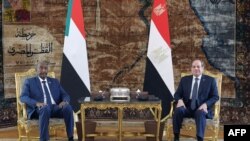The pair "will hold joint bilateral discussions" and "discuss ways to strengthen bilateral relations," according to a statement from Sudan’s governing sovereignty council.
Since last April, Burhan has been at war with his former deputy, Mohamed Hamdan Dagalo, who commands the paramilitary Rapid Support Forces, RSF.
In footage broadcast by the presidency, Sisi embraced Burhan — Sudan’s de facto leader since he and Dagalo led a joint coup in 2021 — at the airport in Cairo and received him in the presidential palace with the ceremony reserved for heads of state.
The presidency also said the pair would discuss "deescalating the situation" in Sudan.
Burhan and his government have retreated to the country's east, governing from the coastal city of Port Sudan, while the RSF controls much of the capital Khartoum, nearly the entire western Darfur region and much of the country's south.
The conflict between the rival forces has killed tens of thousands, including up to 15,000 in a single West Darfur town, according to United Nations experts. It has also decimated the economy, destroyed infrastructure and forced over eight million people from their homes, according to U.N. figures.
For months, Cairo was Burhan's strongest ally amid fighting against RSF.
When Burhan finally exited a four-month RSF siege of his Khartoum military headquarters in August, Egypt’s northern city of El Alamein was his first destination abroad.
The fighting generals have since chased each other around regional capitals, each trying to position himself as lead statesman.
But in recent months, Dagalo appears to have gained the diplomatic upper hand, while his troops made aggressive advances on the ground, pushing the army to retreat and prompting Egypt to distance itself from Burhan, according to analysts.
The Sudanese government, loyal to the army, has on the other hand drawn closer to Iran, with Sudan’s foreign minister visiting Tehran earlier this month.
The United States has in turn voiced concern over "reports about resumed ties between Sudan and Iran that could reportedly include Iranian material support" to the army, which this month managed to regain control of parts of greater Khartoum.
Both sides have been accused of atrocities, including indiscriminate shelling of civilian areas, torture and obstructing humanitarian aid.
Since the fighting began between Sudan’s rival forces, Western governments and aid groups have warned that international actors could be exacerbating the conflict, with the United Arab Emirates accused of funneling arms to RSF.









Forum